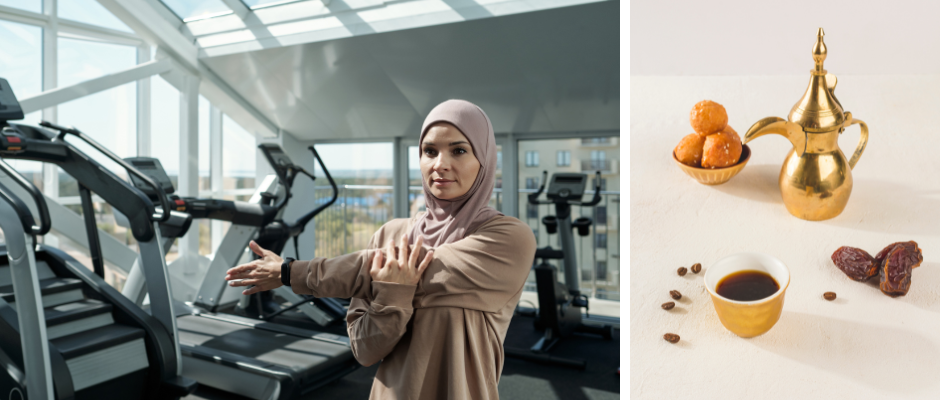Train Before Ramadan? Here’s Why You Should!

Should You Start Working Out Before Ramadan? Why Training Now Will Make Fasting Easier
Ramadan is a time of spiritual reflection, fasting, and self-discipline. But for many, the shift in routine can bring low energy, dehydration, and muscle loss. The good news? Starting your training now can help your body adjust, making fasting easier and keeping your fitness on track.
Here’s why training before Ramadan is a game-changer and how you can prepare.
Why Train Before Ramadan?
- Helps Your Body Adjust to Fasting
When you start fasting, your body needs time to adapt. If you begin exercising now, you can gradually adjust your eating and workout schedule. This helps prevent sudden drops in energy and strength.
- Boosts Energy and Stamina
Regular exercise improves endurance and reduces fatigue. By training now, your body becomes more efficient at using stored energy, helping you feel less tired when you start fasting.
- Prevents Muscle Loss
Many people lose muscle mass during Ramadan due to reduced protein intake. Strength training before fasting helps build muscle reserves, minimizing muscle loss.
- Improves Hydration Levels
Dehydration is a common issue during fasting. If you train now, you can develop a habit of drinking more water before Ramadan starts. This will keep your body well-hydrated.
- Helps Control Cravings and Hunger
Exercising regularly helps balance blood sugar levels, reducing cravings and hunger spikes. This will make it easier to manage hunger when you begin fasting.
- Builds a Stronger Mindset
Training before Ramadan strengthens your discipline, making it easier to stay active and maintain healthy habits during the month.
Common Concerns About Training Before Ramadan
- “Will I feel too tired to work out?”
If you train at the right intensity and stay hydrated, you won’t feel overly tired. Focus on light to moderate workouts instead of intense sessions.
- “Should I do cardio or strength training?”
Both are beneficial! Strength training prevents muscle loss, while cardio improves endurance. A mix of both is ideal.
- “What if I can’t train during Ramadan?”
That’s okay! Training before Ramadan will keep your body strong, so even if you exercise less during fasting, you won’t lose progress.
Best Workouts to Start Before Ramadan
- Strength Training 🏋️♀️
- Focus on bodyweight exercises like squats, push-ups, and lunges.
- Lift moderate weights to build muscle without overexertion.
- Low-Intensity Cardio 🚶♀️
- Walking, cycling, or light jogging keeps your endurance up.
- Avoid long, high-intensity cardio sessions.
- Yoga and Stretching 🧘♀️
- Helps with flexibility and relaxation.
- Reduces stress and improves recovery.
- Functional Training 🔄
- Exercises like planks, kettlebell swings, and resistance band will improve overall strength.
Training and Nutrition Tips Before Ramadan
✅ Hydrate Well: Drink at least 2-3 liters of water daily to prepare for fasting.
✅ Eat More Protein: Helps prevent muscle loss. Include eggs, chicken, fish, and lentils in your diet.
✅ Increase Healthy Fats: Nuts, avocados, and olive oil keep you full longer.
✅ Cut Back on Sugar: Reducing sugar now will help control cravings when fasting starts.
✅ Train at the Right Time: Early morning or evening workouts help avoid exhaustion.
Recent Developments in Fasting and Fitness
- Intermittent Fasting Research: Studies show that fasting can improve metabolism and boost fat loss when combined with strength training.
- Wearable Fitness Tech: Smartwatches help track hydration and energy levels, making it easier to train effectively before and during Ramadan.
- Nutrient Timing Strategies: Experts recommend eating balanced pre-dawn (Suhoor) meals with slow-digesting carbs and protein to maintain energy.
Conclusion: Train Now for an Easier Ramadan
Starting your fitness journey before Ramadan will help you feel stronger, more energized, and better prepared for fasting. By training smart, staying hydrated, and eating right, you’ll minimize fatigue and maintain muscle.
If you need expert guidance, I, Souad Gharib, can help you with customized training plans during Ramadan. Let’s make this Ramadan your healthiest yet!
